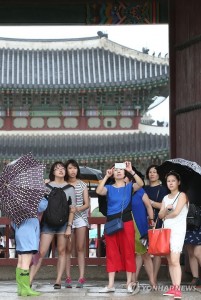- California Assembly OKs highest minimum wage in nation
- S. Korea unveils first graphic cigarette warnings
- US joins with South Korea, Japan in bid to deter North Korea
- LPGA golfer Chun In-gee finally back in action
- S. Korea won’t be top seed in final World Cup qualification round
- US men’s soccer misses 2nd straight Olympics
- US back on track in qualifying with 4-0 win over Guatemala
- High-intensity workout injuries spawn cottage industry
- CDC expands range of Zika mosquitoes into parts of Northeast
- Who knew? ‘The Walking Dead’ is helping families connect
S. Korea reports no new MERS cases for 11th day

Chinese tourists visit Gyeongbok Palace, the main royal palace during the Joseon Dynasty (1392-1910), in Seoul on July 12, 2015. More people are visiting South Korea from abroad as the spread of Middle East Respiratory Syndrome in the country eases. (Yonhap)
SEJONG (Yonhap) — South Korea reported no additional cases of Middle East Respiratory Syndrome (MERS) for the 11th straight day on Thursday, with no fatalities occurring since Friday as well, the health ministry said.
The number of people diagnosed with MERS in the country remained unchanged at 186, and the MERS death toll also stayed flat at 36, according to the Ministry of Health and Welfare.
There were 258 people in isolation as of Thursday as suspected cases following possible exposure to the MERS coronavirus, down 64 people from the day before, it said.
Since the country reported its first case on May 20, nearly 16,700 people have been subject to isolation for possible infection. So far, 16,432 of them have been released after showing no symptoms of MERS for more than the known maximum incubation period of 14 days for the disease.
Out of those diagnosed with MERS, 133 have been discharged from hospitals following complete recoveries, up one compared with the day before.
Of the remaining 17 receiving treatment in hospitals, four are in unstable condition.
MERS is a viral respiratory disease that is still fairly new to humans. The disease has claimed over 530 lives globally, posting a fatality rate of over 36 percent.
In South Korea, the fatality rate stands at 19.4 percent, with most of the people succumbing to the illness having had underlying medical conditions. The ministry said 91.7 percent of the people who died were being treated for cancer or had serious heart, lung or kidney conditions.
There currently is no vaccine or treatment for the disease that was first reported only in 2012 in Saudi Arabia.















